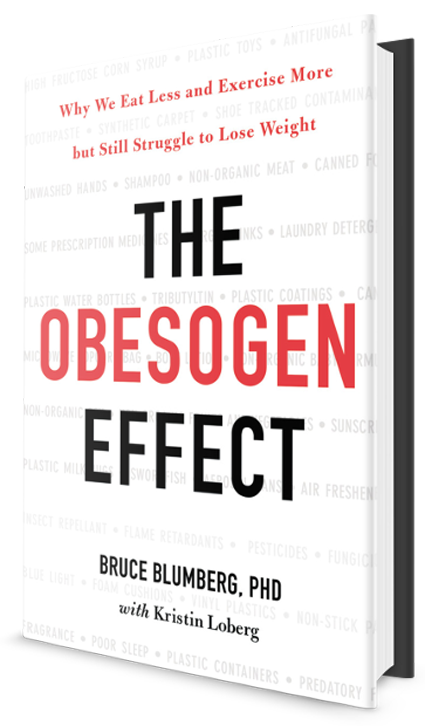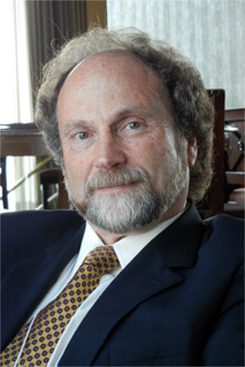Being overweight is not just the result of too many cheeseburgers or not enough exercise. Leading-edge science shows that silent saboteurs in our daily lives contribute greatly to our obesity epidemic: obesogens. These weight-inducing chemicals disrupt our hormonal systems, alter how we create and store fat, and change how we respond to dietary choices.
Obesogens lurk all around us—in food, furniture, plastic products and other surprising exposure points. In THE OBESOGEN EFFECT, Dr. Bruce Blumberg describes how obesogens work, reveals where they are found, and offers a practical three-step solution for reducing exposures and setting a straight course for better health.
Read the Introduction to the book »
BRUCE BLUMBERG, PHD, has been conducting pioneering research in endocrinology and developmental biology for more than thirty years. He is professor in the Departments of Developmental and Cell Biology, Pharmaceutical Sciences, and Biomedical Engineering at the University of California, Irvine (UCI). At UCI, his laboratory studies the biology of nuclear hormone receptors in development, physiology, and disease with a particular emphasis on how these are affected by hormonally active compounds in the diet and environment. In 2012, he was elected as a fellow of the prestigious American Association for the Advancement of Science.
Read more»
-
Why do we get hungry, feel tired, and gain weight? A likely culprit is our fat cells. THE OBESOGEN EFFECT, written by the researcher who literally defined this new field, explains how our diet and other exposures can program the body for weight gain-beyond calories in, calories out-and what you can do about it!
David Ludwig, MD, PH D, author of the #1 New York Times bestseller 'Always Hungry?'
-
If you think obesity is about couch potatoes and gluttony, or calories in vs. calories out, you must think again. Or better yet, read this book. It tells a complex scientific story with vivid, accessible clarity about the role that obesogens—chemical contaminants that can alter our metabolism, appetite, and more—play in making us fat. The bad news is that obesogens are all too common and hard to avoid if you aren’t paying attention. The book’s good news is that there are many simple, practical steps you can take that will protect you and your family.
John Peterson Myers, PhD, Chief Scientist of Environmental Health Sciences, Adjunct Professor of Chemistry at Carnegie Mellon University and author of 'Our Stolen Future'
-
Ever wonder why it is so easy to gain weight and hard to lose it? This simple to read, scientifically factual book can change your life—it is a must read.
Jerry Heindel, PhD, Director of Program on Endocrine Disruption Strategies, Commonwealth
-
You probably agree that cigarettes cause cancer, even knowing that not everyone who gets cancer smokes cigarettes and not everyone who smokes cigarettes gets cancer. Bruce Blumberg makes the case clearly that industrial chemicals cause obesity in a similar way. Bruce is an eminent researcher who, through his discoveries, has changed the way we think about body weight regulation—both in a fundamental way, as well as by providing insight into the role of industrial chemicals. This readable book, with its solid scientific base, will change the way you think about the obesity epidemic—and what we can do about it.
R. Thomas Zoeller, PhD, Professor of Biology, University of Massachusetts, Amherst
Featured Publications
Author(s):Raquel Chamorro-Garcia et al.
Date:December 1, 2017
Summary:This publication from the Blumberg lab shows that ancestral obesogen exposure modifies individual response to diet and fasting by modifying the structure and accessibility of chromatin
See more publications from Bruce's lab »





